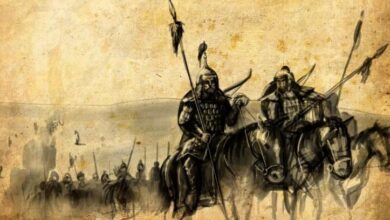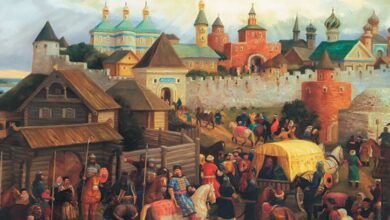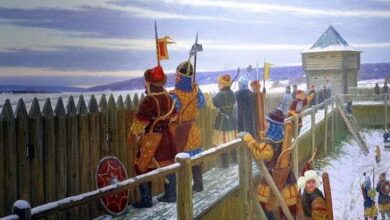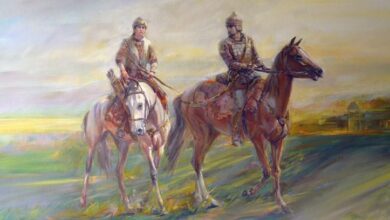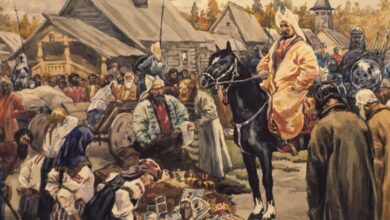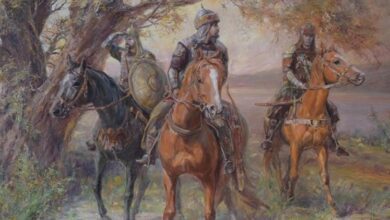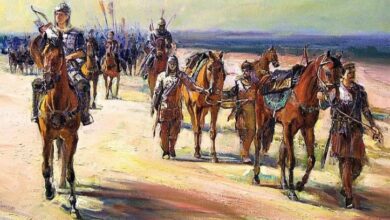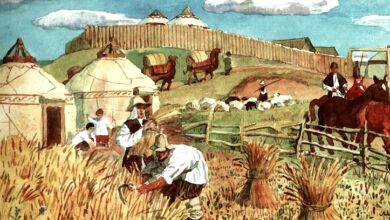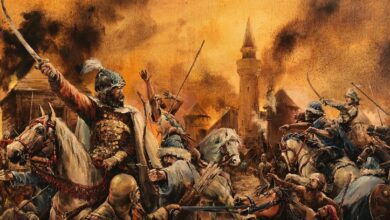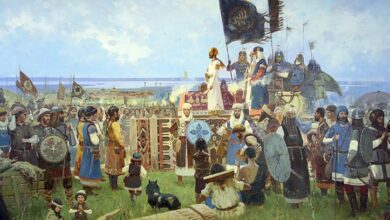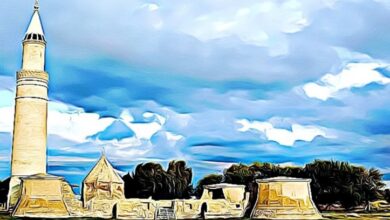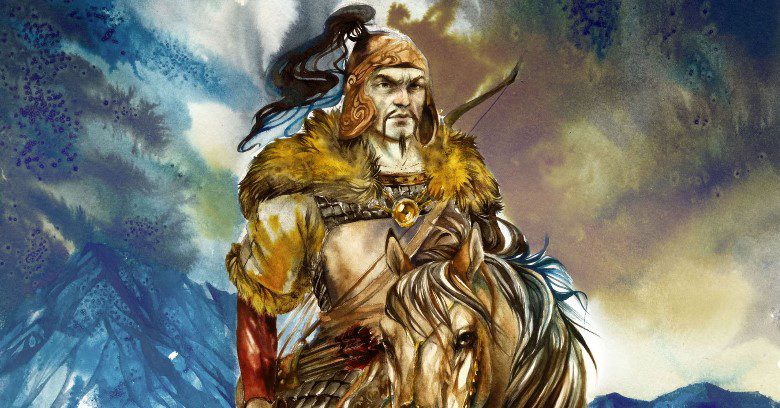
The legend of the Bulgar epic about the emperor Askyp Attila
Author: Begunov Yu.K.
AT end of IV - V centuries. on the East European Plain, in Central Europe, in the Balkans, in the North Caucasus, the eastern conquerors of the Huns, or Khons, who were of ancient Turkic origin, appeared. They came to Europe from the depths of Asia on the wave of the Great Migration of Nations and were led by talented military leaders, such as Balanber, Rugila, Attila, who led a multi-tribal horde and created the Xiongnu-Suba.
At the same time, they were not sovereigns who cared about the economy, culture and welfare of the people. The Eurasian idea and belief in Tangra led them in search of the promised land. The main link of the conquerors were warlike Turks - Khons, who had a stable tribal organization and faith in their leaders and in Tangra and its Alps. This organization dates back to the 3rd century. BC. with their leader Chanyu Modo III. The latter was faithful to the ancient Turkic traditions and respected the Proto-Slavs, which is directly stated in "Prinikania". The nobility of the Khons led the Askyp empire from the Altai to the Danube and to Germany. She owned all of Askyp, including the ancient lands of the Proto-Slavs - Travuniya, Stenia, Ruskolan, and the main headquarters was in Deremel, which later moved to the banks of the Tisza. First of all, the Huns united with the Ugrians and Sarmatians, forming a powerful political union, later the Slavs joined them. Contemporaries unanimously testify to the wild morals and unbridled cruelty of the conquerors. So the Roman historian of the 4th century. Ammianus Marcellinus wrote that “they are treacherous, fickle (…) relying on wild fury in everything. Like mindless animals, they arrive in complete ignorance of what is fair and what is not fair (...) not bound by respect for any religion or superstition, burning with a wild passion for gold, so changeable that sometimes on the same day they retreat from their allies."
Another contemporary reports on the massacre of the Huns with the population of the Northern Black Sea region: “The defeated Scythians were exterminated by the Huns, and most of them died ..., others, having gathered together ... at least 200,000 in number, moved to other lands”, mainly beyond the Danube.
The result of the Hunnic conquests was the collapse of the Roman Empire and its division into two parts since 395: Western and Eastern. In 432, power in the Great Askyp passed to the children of Rugil Mundzak's brother, Attila and Bled, who annexed the troops of many peoples: Slavic, Germanic, Celtic, Magyar, Thracian and others. All of them, in a furious onslaught, attacked Rome, first settling on the left bank of the Danube. In 434, Attila became the sole ruler and led these conquests.
The ancient Bulgars, like the Slavs - the Rus, who founded Kyiv in 430, were captured by the general movement of the Eurasian peoples against the Great Whore, i.e. Rome, dreaming of ending slavery as a shameful state unworthy of a person. Soon Attila settled on the middle Tisza, founding his wooden Turkic-Slavic capital Syun-Bail. In it, he received representatives of many states from 434 to 453. Priscus of Panius positively assessed the customs and morality of the Huns and their allies.
Attila, as a leader, corresponded to the Turkic-Russian ideas about the essence of people's power and about the ideal of a people's leader, who leads the people of Askyp to a brighter future, guided by the Eurasian idea and the will of Tangra.
According to the Byzantine chronicler, John Kedrin, Attila was short, broad-shouldered, with dark hair and a flat face, his beard was sparse. The narrow eyes looked so piercingly that everyone approaching him trembled, feeling in him tremendous unbridled strength and power. Terrible in anger and merciless to enemies, he was merciful and affectionate to his associates and friends, especially to the Slavs, as Prisk of Panius testifies to this.
Attila had many wives and children. He most of all valued the personal devotion of leaders and warriors, their bravery and courage. He was a typical representative of the type of people's autocratic sovereign emerging in Eurasia.
He came from the Dulo clan, whose descendants in the 5th-7th centuries. became Bulgarian Kans, or kings. The great Kans Kubrat, Bat-Boyan, Shambat, Asparukh came from his family. They became the guardians of the Turkic-Slavic mighty states, including the great Kara-Bulgaria, Volga Bulgaria, Danube Bulgaria, Kievan Rus. In five directions, the leaders of the Bulgar people led from their former ancestral home - the North Caucasus - to the Volga, Kama, Danube, and even to Italy, Pannonia, Macedonia for the sake of the greatest great-grandfather glory, ringing from now on for centuries.
Among the last inhabitants of new places, we note the ancestors of the Danube Bulgarians, led by Asparukh, the founder of the First Bulgarian Kingdom.
Their name is Glory!
Tales and heroic songs about Attila were well known to Bulgarian singer-storytellers. Traces of these chants were preserved at the end of the 11th century. bek Elaur Ryshtavly from the Chernihiv kovuy clan, who lived either in Kyiv or in the Great Bulgar.
We will cite excerpts of the text from Bek Elaur’s poem “Bulyar sugheshe yry” that have survived to this day, i.e. "Songs about the Bulyar War". The latter tells about the campaign of the Grand Duke of Suzdal Vsevolod III the Big Nest against the Volga Bulgars in 1183.
It sings of the military exploits of the young Attila, nicknamed Bat - Ilyas in the poem. Among the offenders of the young bek, his brother Dabbud, also known as Bleda, is mentioned. The young warrior threw a spear at that one and it "knocked the spirit out of him." After that, the young man was honored with the patronage of the warrior Gulaim, the daughter of Alp Babai, and with her help he fought valiantly and conquered many kingdoms.
Let us quote excerpts of Bek Elaur's poem that have survived to this day in Russian translation. The merit in their preservation belongs to a group of translators under the leadership of Saifullin (Petropavlovsk, Kazakhstan), who translated these words from Turkic into Russian. A I.M. - K. Nigmatullin and F.G. - H. Nurutdinov kept them in his archive to this day.
A lot of leaves
From the Bulgar Tree, and it was not visible
The end of this misfortune. Dabbud offended everyone. (one)
But especially Bat Ilyas. (2)
Then his mother spoke
Against a dashing relative. But also little Bat-Ilyas,
Born with a leaf on her forehead
Sat on a horse
And he rode after his mother. Having galloped to the battlefield,
He threw a spear at the enemy:
Could it fly
Only for the horse's ears.
But the daughter of Babai herself is alypa (3)
Picked up the boy's spear
And, hitting Dabbud with it,
Kicked the spirit out of him.
Then Gulaim said
To his terrible father:
“This young warrior is dear to me:
We will be together from now on!”
Sang like Boyan at Haijin
Baltavarly, (4)
Song Maker
about past times
Khagan of Bat-Ilyas.
About his pet Elaga: (5)
"It's hard for your head without a shoulder,
It's hard for your body without a head,
And the Khon land - without a kagan.
Bat Ilyas many times
predicted death,
But he didn't stop
Fight with the whole world.
On the seventh century Turjan (6)
Audan got (7) lots
love all life
War maiden Gulaim.
She gave him the ability
Much to know in advance
Taught to become fierce beasts
And move forward in complete darkness.
Empowered by her tricks,
Urusdan leaned on the Khons
And rushed to the city of Kiya, (8)
The capital of all is Atila. (nine)
Taking a spear
Kyi Golden Throne, (10)
Urusbag (11) rushed with arslan (12)
From him to Janavil. (13)
With one banner raising
He opened the gates of Janavil,
transcended fame
Great old Yar-Atay. (fourteen)
From here he jumped
To Strong Bal-Nush (15)
Right at midnight, hidden
Veil of heavenly darkness.
In the morning, having defeated Izdarov Kusy, (16)
Rode to the river Sina - jai, (17)
Yes crossed the path of Khursa: (18)
I had to stop at Maine Mara. (nineteen)
He did not order to touch
Dau - Tugae (20)
People who fled here
After all, he was on Isad (21)
Karamaj Umay. (22)
Thankfully called Audan
Chirkau Umai: (23)
And he is already at Akavyl (24)
I heard this call.
He threw it at the city gates
The coals he took from Maine-Mara,
In the hearth of Karamaja Mara,
And then a terrible storm broke out.
The wind ripped from the houses
huge roofs,
And lightning strikes ignited
Whole blocks.
Akavyl people were scared
And surrendered their city.
Bat left - Ilyas to rest
On the river Nemzai. (25)
At night, after the feast,
Went into his tent
His beloved Gulaim
And closed his eyes forever.
It's hard for people
Without Dau - Barys:
The court of Bat-Ilyas was fair,
He didn't offend anyone.
His sons, who received from him
The cities he conquered
They started arguing about
Which one is greater.
They began to share
Boundless Bulgar land,
Saying: "This is mine,
And that is also mine!”
Learned about troubles
In the Bulgar land,
They came to the sons of Bat - Ilyas
Enemies from all over the world.
But few supported
Sons of Dau - Rysha: (26)
After all, weary people
Their internecine strife.
The sons of Urus fell
In an unequal battle:
Their heads and bones
They dotted the banks of the Nemzai.
That was in those days.
And now the uruses
Friendly like never before
And in the land of the Bulyars there is turmoil.”
OUR COMMENT
- Dabbud is the brother of Attila Bled, the son of Muenchak.
- Bat - Ilyas - one of the nicknames of Attila.
- Gulaim is the daughter of Babai-Alyp, a warrior, patroness of warriors.
- Here is the name of the creator of songs about Attila - Bayan, and he worked at the bek Haydzhin Baltavarly, i.e. at the prince of Tmutarakan Mstislav - Konstantin Vladimirovich, son of St. Vladimir I (989-1036).
- Elag - Illag, son of Attila, died at the Battle of Nedao in 454.
- In the seventh century, Turdzhana ... - the son of Emperor Askyp Targiz, 252 - 237 years. BC, and Guji Ilyarkay, named Turjan, nicknamed Dulo, the founder of the dynasty of the White Huns or Khons, from which Attila descended.
- Audan is one of Attila's nicknames.
- Kyi - Pereyaslavets on the Danube.
- Agil - Balkans.
- City of Prince Kiy Pereyaslavets.
- Urusbak is one of Attila's nicknames.
- Arslan is a lion.
- Janavyl - the city of Novy on the Danube.
- Yar-Atay is one of the nicknames of Emperor Askyp Atey, 371-339. BC.
- Bal-Nush is the Bulgarian name of the city of Nisha.
- Izdarovy Kusy - the regiments of the Roman commander Aetius on the Catalaunian fields, 451.
- Sina-jai - r. Seine.
- Khursa - Alp, or the spirit of blacksmithing. It was believed that the one who crossed his path, mastered the secret of his blacksmithing skills.
- Maine - Mar - Montmartre hill in Paris.
- Dau - Tugai - an island on the Seine, now called Cité.
- Isad is an island.
- Karamaj Umay is the sanctuary of the Alp Mar in Montmartre, Paris.
- Chirkau Umai is the sanctuary of the goddess Umai, on the site of which the Christian temple of Notre Dame later arose.
- Akavyl is the city of Aquileia.
- Nemzai or Nedao is a river in Croatia, where the battle of the Huns and other peoples, led by the son of Attila Illak, against the army of the Gepids, commanded by King Ardarik, took place. The Huns were defeated. During this battle, Attila was no longer alive: he died in 453 in his palace on the banks of the Tisza River.
- Dau - Rysh - one of the nicknames of Attila.
The last quatrain cited from the poem sets off the contrast of actions: the enmity of the Bulgars of the Polovtsian Field among themselves and the friendship of the Rus of Kievan Rus, still united under Vladimir II Monomakh.
The surviving epic about Attila strikes the imagination, singing the bakhadirs of bygone times.

